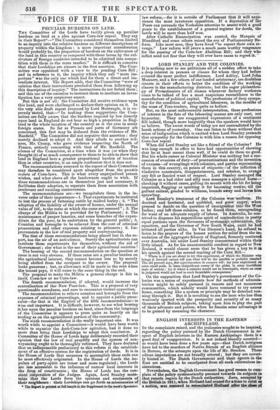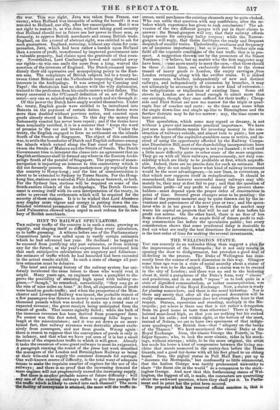. ENGLISH INTERESTS IN THE EASTERN ARCHIPELAGO.
IN the complaints raised, and the jealousies sought to be inspired, regarding the policy pursued by the Dutch Government in re- spect of English interests in the Eastern Archipelago there is a good deal of exaggeration. It is not indeed broadly asserted— as would have been done a few years ago—that Dutch intrigues have led to the murders of Native friends of an English alliance in Borneo, or the attempts upon the life of Mr. Brookes. These odious imputations are not broadly uttered ; but they are covert- ly hinted at. The Dutch Government and their agents in the East are entitled to be exculpated from all such calumnious in- sinuations.
Nevertheless, the English Government has good reason to com- plain of the policy systematically pursued towards its subjectiin that remote region. by the Dutch authorities. Java, occupied by the British in 1811, when Holland had ceased for a time to exist aa a nation, was restored to resuscitated Holland after the close of the war. This was right. Java was taken from France, our enemy, when Flohand was incapable of acting for herself: it was restored to Holland, our ally, after her emancipation. But it was not right to restore it, as was done, without taking good security that Holland should not in future use her power in those seas, as formerly, to oppress British merchants and cramp British trade. England, on the ground of abstract right, was entitled to ask for such guarantees. England, restoring, without any claim for com- pensation, Java, which had been rather a burden upon Holland than a source of profit, transformed by improved government into a valuable property, had claims upon the gratitude of that coun- try. Nevertheless, Lord Castlereagh bowed and smirked away our rights—to win one smile the more from a king, waived the assertion of the interests of England. The Dutch resumed imme- diately their old oppressive and monopolizing policy in the East- ern seas. The complaints of British subjects led to a treaty be- tween Great Britain and the Netherlands respecting their mutual interests in the Archipelago. It was arranged by Canning and Fa'gel : the rhetorician had no chance with the wily diplomatist, trained to the profession from his cradle under a wilier father. The treaty answered to the O'Connell definition of an act of Parlia- ment—any one so minded might drive a coach and six through it. Of this power the Dutch have amply availed themselves. Under thc treaty, English .goods were entitled to be introduced into Batavia on the payment of certain duties. These duties were more than doubled without previous notice, and exacted upon goods already stored in Batavia. To this day the money thus dishonestly exacted has never been repaid ; and if the duties have been nominally rectified, it is in a manner that "keeps the word of promise to the ear and breaks it to the hope." Under the treaty, the English engaged to form no settlement on the islands South of the Straits of Singapore. The object of this condition was, to settle the boundaries of Dutch and English influence among the islands which extend along the East coast of Sumatra be- tween the Straits of Malacca and the Straits of Sunda. The Dutch Government tries to interpret the clause into an agreement that no English settlement shall be formed anywhere in the Eastern Archi- pelago Smith of the parallel of Singapore. The progress of steam- navigation is imparting an interest to this controversy which it did not formerly possess. Steam-packets now ply regularly from this country.to Hong-kong ; and the line of communication is about to be extended to Sydney by Torres Straits. For the Hong- kong line, stations are wanted at Pule Labuan or Sarawak, or both. For the Sydney line, stations will be required on some of the South-eastern islands of the Archipelago. The Dutch Govern- ment is arming itself with its own interpretation of the treaty, in order to prevent the settlements which will be required for the security of these stations. 'It is to be wished that Lord Aberdeen may display more vigour and energy in putting down the un- founded territorial pretensions of the Dutch Government, than Lord Palmerston showed when urged to seek redress for its rob- bery of British merchants.











































 Previous page
Previous page